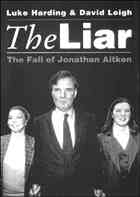Luke Harding, David Leigh and David Pallister
Penguin, 1997, £6.99
George Orwell said that Robinson Crusoe was a good example of a bad book, clumsily written but of natural interest due to its subject. The same is true here. Heroic and triumphant in tone, the troika of authors concentrate mainly on the paraphernalia, research and minutiae of a big libel trial leaving in their wake more loose ends than a Gordian knot.
Aitken had a classic Tory background. Eton/Oxford, inherited Beaverbrook wealth, writing speeches for Selwyn Lloyd (the Chancellor of the Exchequer) at 19 etc. He was also a libertarian, calling for drugs to be decriminalised, conducting numerous high society affairs and surviving an Official Secrets trial in 1969, having revealed too much about whom Britain was backing in the Nigerian civil war. After a brush with Slater Walker he got into the House of Commons in 1974. And then? Well – not very much, publicly: 18 years on the back-benches during which he called for an enquiry into the plots to destabilise Wilson and voted against the Poll Tax. But privately, it was a different matter. Harding, Leigh and Pallister dive into News of the World territory with a whole chapter on the Aitken sex life. We learn that he was/is a sado-masochist and once ran a health farm that Linda St Clair (yes – Miss Whiplash) used as her HQ. Maybe this side of Aitken is connected to his curious self-abnegation towards Arab royalty from whom, after circa 1976, he was making huge amounts of commission brokering arms deals. But, on the other hand, the Tory MP – public schoolboy – sexual deviant/fetishist figure is scarcely fresh news. Didn’t we hear all about this around the time of Profumo?
The authors make a big noise about the general immorality of the arms trade and arms manufacturers. What they don’t probe, in any great depth, are Aitken’s unorthodox political connections. He was co-director, with Gerald James, of BMARC (the shippers of ‘arms to Iraq’). Readers of James’ memoir will remember him, back in 1973/74 in UNISON with G. K. Young. Similarly we are told that one of Aitken’s close advisers (not named) was a confidante of Sir James Goldsmith – another name lurking in the background during the Wilson years – and that Aitken chaired the Conservative Philosophy Group.
During his famous weekend at Mohammed Al-Fayed’s Paris Ritz, the only call back to the UK that Aitken made was a lengthy exchange with Labour left-wing MP Diane Abbott, at her home in Hackney – an odd call for the broker of a big arms deal to make. All these items are brushed against in the text and then forgotten. Not mentioned at all are the odd sequence of deaths in and around Aitken and the British arms industry after 1990 – Gerald Bull, Farzhad Bazoff, Jonathan Moyle; and, most intriguingly, Stephen Milligan MP, Aitken’s Parliamentary Private Secretary and, allegedly, the fatal victim of an auto-erotic sex act. These may well be unconnected. They illustrate, though, one area Harding, Leigh and Pallister could have examined – the enormous size and scope of the British armaments industry, the lengths it will go to to protect and further its interests (of which Aitken’s undeclared interests and commissions are only a small example) and, perhaps, the way the armaments industry grows whilst the nation’s manufacturing and defence capabilities continue to shrink.
Book your seat now for Round Two, the Aitken perjury trial . . . his defence that he was working for MI6 all along. After the sentence is handed down we should have the material for a better and more interesting book than the story of how the Guardian added the Aitken scalp to the Hamilton scalp.
